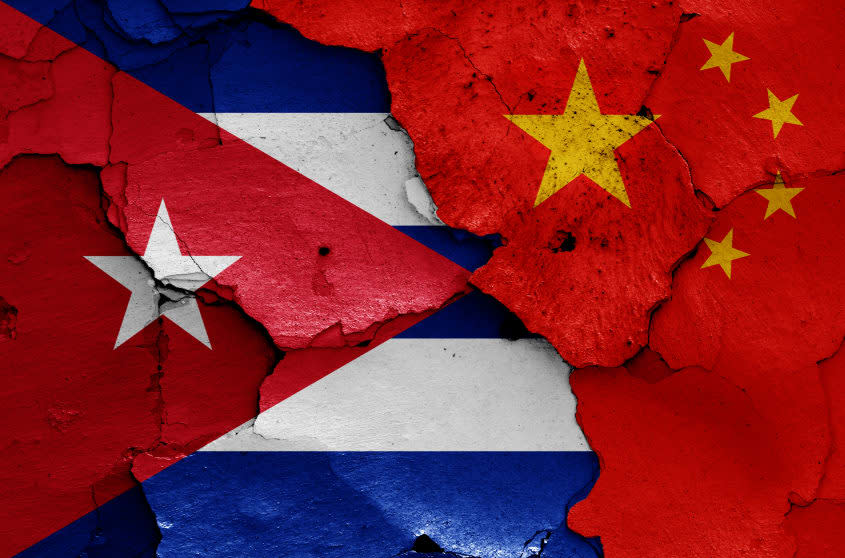The China-Cuba connection, explained

Call it the Cuban Eavesdropping Crisis. China has reached a secret agreement to build an electronic eavesdropping facility on the island nation less than 100 miles from the Florida coast, The Wall Street Journal reported. That location would let Chinese spies "scoop up" electronic communications in the southeast U.S. — a region home to a sizable portion of the nation's domestic military bases.
White House officials disputed the accuracy of the report, CNN reported, although they didn't detail their objections. "We have had real concerns about China's relationship with Cuba," said National Security spokesman John Kirby, "and we have been concerned since day one of the Administration about China's activities in our hemisphere and around the world." What is happening in Cuba? And how will China respond?
What is happening in Cuba?
Some context: Since Communist revolutionaries took over in 1959, Cuba has a history of serving as a proxy for America's foreign rivals. In 1962, the world came to the brink of nuclear war when it was discovered that the Soviet Union was building nuclear missile sites on the island. The Soviet Union has long since disappeared, but China and Cuba "have forged increasingly close ties since the end of the Cold War," the New York Times reported. China is Cuba's largest trading partner. The reported deal may be more of the same: "This is basically Chinese pay-to-play," one analyst told the Wall Street Journal. "China gives money to Cuba it desperately needs, and China gets access to the listening facility."
It doesn't seem that the spying facilities have been built or started operations in Cuba. Instead, Politico reported, the countries are still in negotiations on the issue. Both nations denied the reports, however. "Slanders like these have been fabricated frequently by U.S. officials," a Cuban official told CNN. Reuters reported that the Chinese foreign ministry also accused the U.S. of "spreading rumors and slander."
Don't China and Cuba already have a relationship?
Possibly. Days after the news broke, The New York Times reported that China has been running a spy base in Cuba since 2019.
What is Washington saying?
Leading Republicans used the opportunity to criticize the Biden administration. "Joe Biden needs to wake up to the real Chinese threats on our doorstep," presidential candidate Nikki Haley wrote on Twitter. Others, like Sen. Josh Hawley (R-Mo.), followed suit.
CBS News reported there was at least one bipartisan response. "We are deeply disturbed by reports that Havana and Beijing are working together to target the United States and our people," Sens. Mark Warner and Marco Rubio, the Democratic and Republican leaders of the Senate Intelligence Committee, said in a joint statement. They added that it is "unacceptable for China to establish an intelligence facility within 100 miles of Florida and the United States." The Guardian reported that Sen. Bob Menendez (D-N.J.), who chairs the Senate Foreign Relations Committee, said a Chinese facility in Cuba would be "a direct assault upon the United States."
But at least one commentator is urging restraint. News of the spy base might be discomfiting, Washington Post columnist Max Boot wrote, "but it's no outrage, and it's no reason to blow up efforts to improve relations with Beijing."
Does the U.S. ever spy on China?
It's fair to say that intelligence gathering is a two-way street. "Beijing has for decades decried what it sees as U.S. intrusiveness for flying surveillance aircraft and sailing military survey vessels" near Chinese shores, the Wall Street Journal noted. CNN noted that in May an American surveillance plane was intercepted and "harassed" by a Chinese fighter jet in international airspace over the South China Sea. These encounters are not uncommon: In 2001, a U.S. Navy spy plane was forced to land on China's Hainan Island after colliding with a Chinese fighter. The 24-person aircrew was held for 10 days before being released.
What's next?
U.S. officials have spent recent months trying to "thaw" relations with China that went south after the spy balloon incident in February. The latest revelations might put an end to those efforts, Politico reported, at least for now. Dialogue between the two countries exists mainly at the "economic and trade level, while military-to-military discussions are practically nonexistent."
The ramifications should become clear fairly quickly: The Associated Press reported that Secretary of State Antony Blinken is expected to travel to Beijing on June 18 for a meeting that was postponed in the aftermath of the balloon incident. If — as many observers fear — the United States and China end up waging a second Cold War, news of the Cuba eavesdropping deal might be seen as a key turning point.
You may also like
4 things to consider when leaving an inheritance

